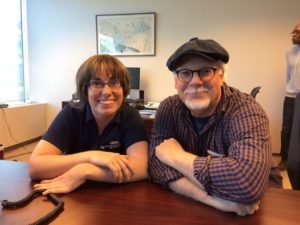
By: Crystal Darby and Anna Borrego
Growing up without role models makes it difficult for a student to envision his or her future. It’s even more difficult if you are a student with a disability. For Mariah Kilbourne, however, it spurred a desire to be a role model for others.
Kilbourne started as the Marketing Associate for the UTSA Small Business Development Center in the Institute of Economic Development in August 2015. Within eight months, she had applied for and was promoted to the Training Coordinator position.
She has added and facilitated over 180 workshops on the SBDC training schedule, met with numerous trainers both inside and outside her organization, and worked directly with the SBDC business advisors. Her coworkers would describe her as perpetually sunny. She is effervescent. Being around her makes it difficult for even the crankiest person to have a bad day.
All of this would be an accomplishment for anyone, but Kilbourne does it all in a wheelchair which she appropriately named “The Beast.” Born with cerebral palsy, she has sought out opportunities to represent and help people with disabilities wherever she has been.
Her efforts have now been recognized on the national level. She was one of four across the United States chosen by www.disability.gov for their “No Boundaries” Photo Project. Kilbourne flew to Washington, DC for a photo shoot and interview to showcase the employment success of individuals with disabilities. Disability.gov is a federal government website that provides information about disability-related programs, services, policies, laws and regulations. Kilbourne’s profile will be featured on the site in July.
The Texas Lutheran University Alumni Association named her the TLU’s Outstanding Young Graduate in 2016. While attending TLU, Kilbourne pushed for wheelchair access and wrote a manual to help students with disabilities at the university and in their lives. After graduation, she worked at the City of Seguin’s Main Street Program and advocated for accessibility on the downtown streets. She went on to continue that advocacy when she was chosen as Miss Wheelchair America 2013.
Her role as the Training Coordinator at the UTSA SBDC offers her the opportunity to continue to grow in her leadership abilities. In her short time with the department, she has exceeded goals in the number of small business workshops and number of attendees in those workshops. Her cheerful attitude spurs productivity and team work in the office. Kilbourne spreads her positivity not only to her fellow coworkers but to everyone she comes in contact with on a daily basis. She epitomizes what a positive role model is all about – someone who brings out the best in others.
“As a child, I did not know many other people with disabilities – both as classmates, or as role models in the workplace or in the community at large. As I got older, I learned some disheartening facts about people with disabilities in the workforce – that only 34% of people with disabilities who are eligible to work are actually employed in the workforce. I hope to show that people with disabilities are able to be active participants in the workforce and in the community at large. Everyone has important, unique contributions to make and talents to share – by being who we are. I have been very fortunate to be part of the community at UTSA, specifically at the Institute for Economic Development and UTSA Small Business Development Center. It is amazing to be part of a team that is very supportive of the abilities each individual brings to the team. I hope that younger people with disabilities have the opportunity to experience such a community and workplace,” states Kilbourne.
The UTSA Institute for Economic Development is dedicated to growing businesses, creating jobs, and fostering economic development. The IED consists of 12 centers and programs that provide professional business advising, technical training, research, and strategic planning for entrepreneurs, business owners and community leaders. These programs serve San Antonio, the Texas-Mexico border area as well as regional, national and international stakeholders. Together with the federal, state and local governments, and private businesses, the UTSA Institute for Economic Development fosters economic and community development in support of UTSA’s community engagement mission.





